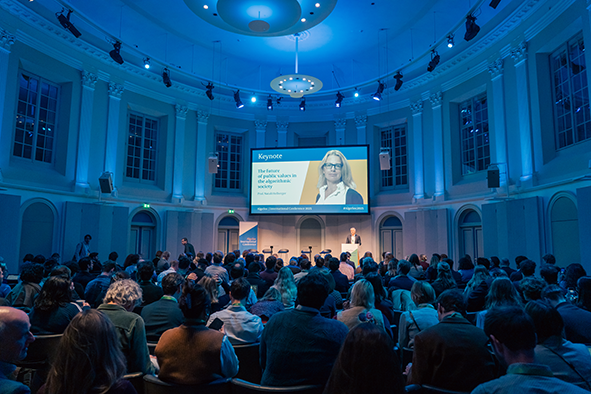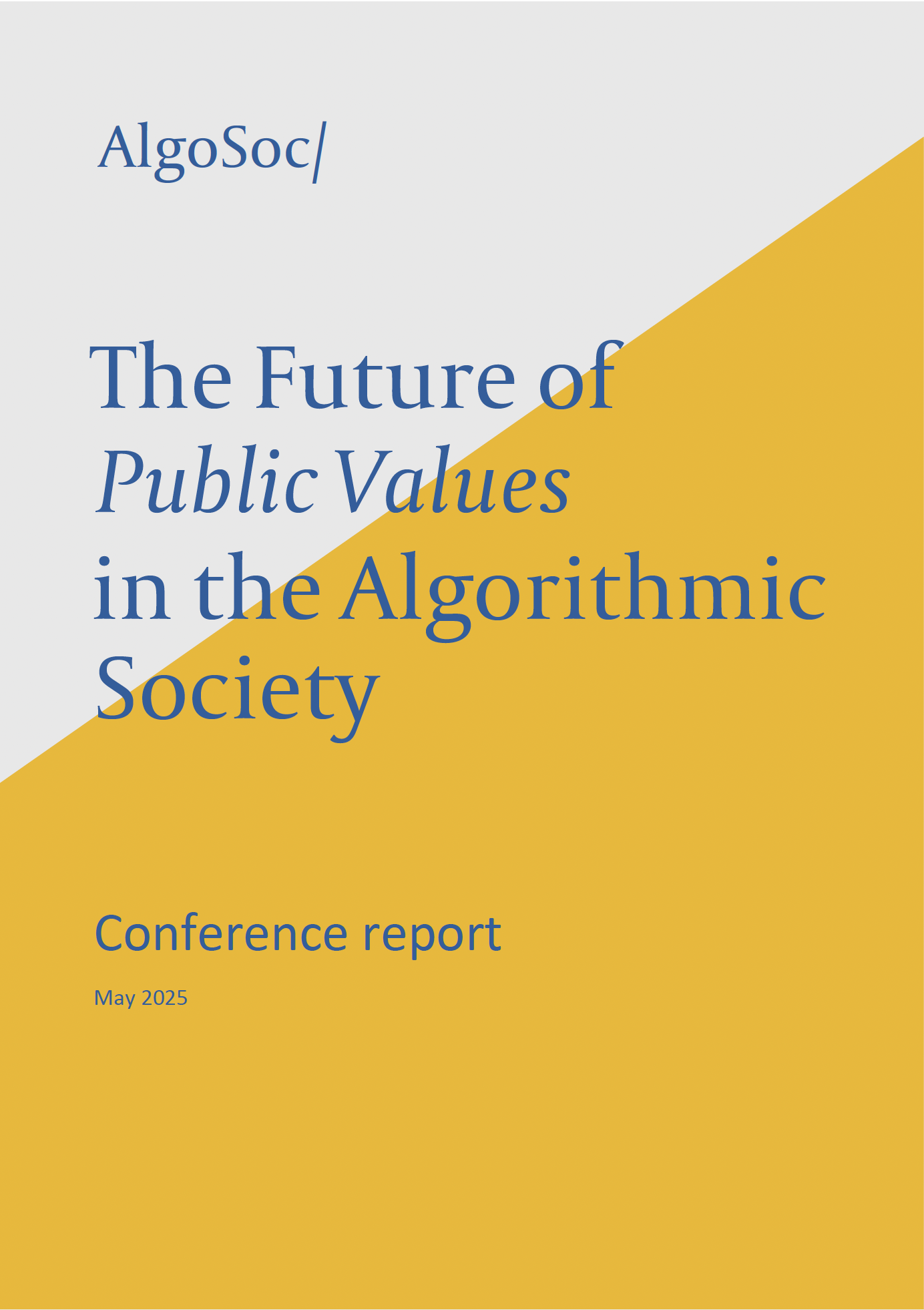July 09, 2025
The future of public values in the algorithmic society: a recap of AlgoSoc's conference

As algorithms and artificial intelligence increasingly shape our societies, the AlgoSoc conference Realising Public Values in the Algorithmic Society critically examined the societal, political, and ethical dimensions of these technologies. Rather than focusing solely on innovation, the conference explored how AI intersects with democratic values, legal systems, healthcare, media, and digital infrastructure. Through interdisciplinary dialogue, keynotes, panels, and an AI-driven art exhibition, the event highlighted the urgent need to embed public values such as fairness, transparency, and accountability into the technological systems that are rapidly transforming our world.
As algorithms and artificial intelligence play an ever-larger role in our societies, they raise urgent questions about the future we want to create. Technological advances offer tremendous opportunities, but also challenge how we safeguard public values such as fairness, privacy, and transparency.
These are not just technical issues — they are societal choices that demand critical reflection and public debate. Recent developments show how technology and political power are increasingly intertwined. What happens when powerful actors control the technologies that shape public discourse and decision-making? And what are the consequences when public values are at stake in struggles between private interests, governments, and citizens?
The AlgoSoc conference Realising Public Values in the Algorithmic Society (10-11 April 2025, Amsterdam) aimed to shift the focus from technology and the promise of innovation to the political, economic, and societal contexts in which technologies evolve.
The conference was inherently interdisciplinary. With nearly 300 participants from 23 countries, it brought together scholars, regulators, media professionals, civil society organisations, and many other stakeholders. The event featured 50 paper presentations, 3 keynotes, 10 panel discussions, 32 poster sessions — and an AI-based art exhibition by our friends at AICON.
🎬 Watch our aftermovie below and read our conference report for summaries of the keynotes and panel discussions.
As a teaser, here are some of the key lessons we drew from the conference:
1. Broadening AI Research and Governance from a Tech-Focused to a Societal Perspective
In her keynote, Natali Helberger argued that to truly serve the public good, AI governance must shift focus from technical design to societal impact—placing power dynamics, human oversight, and public values at the heart of research, regulation, and innovation.
2. Rethinking Public Values and AI Governance in the Algorithmic Age
This panel emphasised that embedding public values in AI governance requires interdisciplinary collaboration, democratic control over digital infrastructures, and a stronger civic role for researchers in shaping and scrutinising technological change.
3. A Sphere-Centric Framework of Justice for the Algorithmic Society
In her thought-provoking keynote, Tamar Sharon proposed that digital technologies must respect the unique values of societal spheres like education, health, and politics—protecting their autonomy from tech-driven values such as efficiency and control.
4. Europe’s Digital Agenda in a Polarised World
Panelists stressed that to uphold public values in a fragmented global landscape, Europe must invest in sovereign digital infrastructures, challenge Big Tech dominance, and reinforce democratic institutions and academic freedom.
5. Application of AI in Healthcare
This discussion highlighted that while AI in healthcare holds great promise, progress must be rooted in cross-disciplinary collaboration, attention to data limitations, and ethical reflection on the trade-offs between innovation, equity, and care.
6. AI in the Courtroom: Realism and Oversight
As AI enters the judiciary, panelists stressed that human oversight, legal clarity, and transparency are vital to safeguard judicial independence, public trust, and the legitimacy of algorithmic tools in courts.
7. The Future of News Consumption
Algorithmic news delivery is reshaping how citizens engage with public information—raising urgent questions about exposure, diversity, and the role of platforms in sustaining democratic discourse.
8. Responsible Machine Learning in AI Health Applications
This panel concluded that deploying AI responsibly in healthcare requires legal accountability, integration of domain expertise, and continuous evaluation—ensuring that such systems enhance, rather than complicate, medical practice.
9. Algorithmic Harms, Justice, and Remedies
Ensuring justice in the algorithmic society requires systems that can be contested, inclusive design processes, and public education—making space for affected communities to challenge automated decisions and seek redress.
10. Systemic Risks of (Generative) AI
Panelists agreed that systemic risks can’t be addressed through internal audits alone—governance must be participatory, transparent, and shaped by diverse stakeholders beyond the tech industry.
11. Computational Infrastructures and Alternatives
Europe’s digital sovereignty hinges on developing public, open, and collaborative alternatives to Big Tech cloud infrastructures—grounded in public values and protected from securitisation.
12. Preventing the Disruption of Democracy
In her keynote, Marietje Schaake warned against the rise of “CEO-kings” and urged Europe to counter democratic erosion by investing in transparency, robust public information systems, and alliances for technological independence.
13. From Regulation to Resilience: Protecting Democracy in the Age of AI
This final panel called for a shift from regulation to resilience—through education, social innovation, academic engagement, and a shared vision for a democratic digital future.
More results /
 Je medisch dossier inladen in nieuwe functie ChatGPT? Denk 10.000 keer na
Je medisch dossier inladen in nieuwe functie ChatGPT? Denk 10.000 keer na
By Natali Helberger • January 19, 2026
By Roel Dobbe • November 24, 2025
By Roel Dobbe • November 12, 2025
 Combatting financial crime with AI at the crossroads of the revised EU AML/CFT regime and the AI Act
Combatting financial crime with AI at the crossroads of the revised EU AML/CFT regime and the AI Act
By Magdalena Brewczyńska • January 16, 2026
By Sabrina Kutscher • July 02, 2025
By Natali Helberger • March 06, 2025
By Maurits Kaptein • June 06, 2025
By Leonie Westerbeek • November 22, 2024
 Clouded Judgments: Problematizing Cloud Infrastructures for News Media Companies
Clouded Judgments: Problematizing Cloud Infrastructures for News Media Companies
By Agustin Ferrari Braun • January 29, 2026
By Fabio Votta • November 05, 2025
By Ernesto de León • Fabio Votta • Theo Araujo • Claes de Vreese • October 28, 2025






